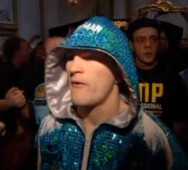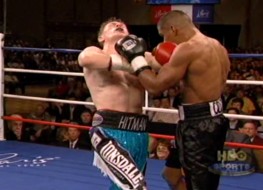|
Ricky Hatton Belts Again

By Karl E. H. Seigfried
On Saturday night, England’s Ricky Hatton won back the IBF title at light welterweight that was once his. The IBO belt was a bonus. Colombian (and now Floridian) southpaw Juan Urango showed well in two rounds out of twelve, but dropped a clear-cut unanimous decision to give up his belts. While the superbly-conditioned Hatton never seemed to break a sweat, the heavily-muscled Urango looked like he never really got warmed up.
At 139 pounds, both Hatton and Urango were a pound under the light-welter limit at the weight-in. By fight night, the two were up in the light-middle range at 149. Both fighters were wearing 10-ounce gloves for the first time, instead of the usual 8-ouncers. A new rule from the Nevada commission now requires the larger gloves for all fighters at lightweight and above.
Urango looked as powerful and muscular as a bodybuilder, but claims to have never lifted weights; the story is that his muscles all come from a childhood spent pulling boulders from the river near his hometown in the mountains of Columbia to sell to contractors. Bringing back the old debate about the musclebound, Urango looked consistently a full class slower than Hatton in both offense and defense. “Sometimes,” said Hatton before the fight, “that muscle mass takes away a bit of speed.”
Although Hatton has been known to balloon up in weight to over 175 pounds between fights, he is always dedicated come training time and enters the ring in fantastic form. When his world title shot against Kostya Tszyu was scheduled for 2 a.m. local time in his hometown of Manchester (for broadcast reasons), Hatton faithfully performed his roadwork and gym workouts at that ungodly hour to make sure he would be ready for the match. His conditioning and stamina this time out were evident as he outworked Urango, landing over a hundred more punches during the course of the fight.
Hatton began the first round at close quarters and was immediately busier, faster, and more accurate. “There’s a science to fighting close,” he said last year. He looked as light and fleet on his feet as a dancer, and he continually threw punches from his trademark odd angles as he slipped and twisted away from Urango’s sluggish counterpunches. His continuously fast pace swept the first four rounds, but repeated heavy bodyshots from Urango in the fifth slowed him way down as the titleholder came on to take the frame.
Referee Tony Weeks called a time out in the sixth for a low blow by Hatton, but Urango waived his right to a longer pause. The Mancusian regained the momentum and took the round with a body attack of his own. By the seventh, he was back at full speed and looked as fresh as if it was the first. Throughout the fight, Urango raised his hands victoriously as the rounds ended, but other than some good headshots in the ninth that gave him the point, nobody else thought he was putting anything in the bank.
After both fighters landed some solid hooks in the tenth, Weeks called another time out in the eleventh, this time for a massive clashing of heads that miraculously didn’t open up the notoriously cut-prone Hatton. For the rest of the round, Hatton switched to a favored tactic: holding. He seemed shaken, and at one point almost fell through the ropes. In the final round, Hatton ran out the clock with more clutching, later saying, “I took me foot off the gas a little bit.” Not a dramatic finish, but a solid win that all three judges scored as 119-109 for the Englishman.
Hatton is once again a title-holder at light welterweight, and his record now stands at 42-0, like the other major British champion, super middleweight Joe Calzaghe. The IBF, WBA, WBU, and Ring light welterweight belts all previously belonged to Hatton, along with the WBA welterweight title he won from Luis Collazo in his one-fight venture up in weight. He eventually gave up each of the belts when HBO proved uninterested in airing any of his mandatory challengers, in yet another series of situations where the sanctioning bodies shot themselves right in the foot.
The contracted summer superfight can now go forward with Jose Luis Castillo, who was victorious on Saturday night’s undercard. Not that a star fighter losing his “tune-up” has stopped any recent money matches (see Barrera, Judah, etc.), but at least this one seems just a little bit more logical.
Ricky Hatton: The “Test” gets passed, mission accomplished?

By Andy Olsen
In my preview, I was a little critical of HBO’s billing for the American leg of last nights’ action, emanating from the Paris hotel in Las Vegas. I felt both Hatton and Castillo should have been touted as having capable opponents, and not two fighters who were there as a warm up for a later fight. Perhaps HBO knew that their charges would be effective rather then attractive. Maybe they knew that the time they have both had out of the ring would lead to difficulties when they stepped into it.
Either way, both came through the problems that Juan Urango and Herman Ngoudjo offered in their respective contests. Ricky certainly dominated his opponent more than “El Temible” did. Hatton neutralised the threats that Urango offered, with the Colombian offering very little in terms of credible offence throughout. He charged in at his opponent a little in the first, but between rounds 2-6 put on a decent display of effective boxing. However in round 5 he was visibly shaken by a decent body shot, and it did appear to slow down his momentum in the rounds that followed..
I imagine several Hatton fans had their hearts in their mouths in round 6. An accidental clash of heads, caused by Urango as he leant in, looked to hurt the Hitman. He has had a tendency to cut in previous fights, and it came as a relief when the pictures showed he had come out of it without any visible damage. Ricky continued to engage close in, and work his way out of clinches with decent shots to head and body.
From round 6 onwards Ricky’s work rate appeared to drop. As a Hatton fan I regard the persistant clinching as a valid tactic, as the referee seemed happy to let it go. However if I were a neutral I would have preferred the referee to at least warn the Hitman for the frequent use of this spoiling move. Hatton appeared happy to let Tony Weeks break it up, chosing to close the fight out in a similar fashion.
Corner Microphones heard Hatton’s trainer Billy Graham encourage his charge to carry on. He felt the Hitman was tiring, and did not wish to invite the now former titlist back into the contest (“don’t try to be a hero” he was overheard instructing in between rounds 7-8). Urango’s inability to prevent Ricky from engaging in such a fashion meant he could not do any real scoring of any note, and as a result was soundly outpointed. I felt the three judges’ identical 119-109 scoring was a little wide, yet can have no serious arguments that they were not impressed with the Colombians’ output.
The Sky TV team afterwards raised issues that surrounded the preparation for this contest. Ricky did not look particularly healthy at this weight (scaling 139 lbs at the weigh in). The skinny, drained look suggested coming down from the weight he evidently puts on between fights could be an issue now, at this more advanced stage of the Hitman’s career. I personally hope this is nothing that an improved regime in between camps can’t resolve, but at 28 it may be harder for him to manage than in his fresh-faced earlier days. The visible tiring also provided us with a worry; stamina has always been seen as a key weapon in his arsenal. Evidence of this can be best found in the Tsyzu fight, where he kept up a relentless pace which eventually became too much for his foe.
Let us not forget though that Hatton won, fairly easily, against what was regarded as a legitimate opponent. He can now focus on a potentially superb contest with Jose Louis Castillo, who kept his side of the bargain with a split decision victory over previously unheralded Herman Ngoudjo. It was evident that he was indeed coming off a layoff (well let’s be honest he was banned over the Corrales non-event wasn’t he?), getting outworked by his younger, very game opponent.
Castillo showed signs of his undoubted class in spurts, confusing Ngoudjo and doing what he felt was enough to put the rounds in the bag. Fair enough, it was a comeback fight, but I’m sure Ricky’s team may be encouraged at the way Castillo was rocked at times. I feel his opponent showed enough to suggest he will be a capable world class operator, should the decent performance he put in here not put him up there already. One judge even awarded the verdict, with the other two giving it to the seasoned pro. I felt Castillo just did enough, but the jeers that rang out in the arena suggested otherwise.
So the aforementioned twosome simply had to emerge from their contests victorious in order to secure a shot at each other. The same couldn’t be said for Junior Witter, who made the first defence of his WBC light-Welterweight crown. It was the manor of the victory which was considered to be important as well, in order for people to consider him a more viable option for their fighter to step in the ring with. I’m afraid it really was a terrible affair. No-one denies that Witter is a good, clever fighter. He had the measure of his opponent Arturo Morua, who if we are going to be honest, didn’t offer anything in terms of proof that he belonged in the same ring as the switch hitter from Bradford.
The opinion has been offered that Witter tried too hard. His in ring antics (stretching his arm out, trying to do a karate style backfist etc.) did nothing to impress the watching audience. Nor I imagine will it endear him to anyone watching within the trade itself. The ending summed up the whole unsatisfactory nature of the contest. Some good work by Witter caused the referee to intervene with his bewildered opponent holding on, back turned.
A much better contest occurred in the chief support of the entertaining bill Mick Hennessey promotions put on, at the Alexandra palace in London. Lenny Daws and Barry Morrison deserve all the plaudits they were both given for their efforts. The stock of both fighters rose considerably, in a really decent domestic scrap. Daws, defending his British title, began lethargically, with Morrison claiming the early advantage. Lenny, buoyed by a highly vocal group of supporters, tried to overturn the early deficit, and certainly made the end result debatable.
I personally thought Morrison had done enough, but wouldn’t have offered too big a complaint to either outcome. Or so I thought. I couldn’t hide my disbelief when it was announced that the normally highly competent Paul Thomas has Daws winning 117-112. It was a close fight at best, as the other two who had Barry winning by one and two rounds respectively would attest. We can only wonder what he saw the champion do so effectively that pretty much everyone else missed. A rematch was talked about afterwards, and it certainly would be well received by the British boxing public.
|


